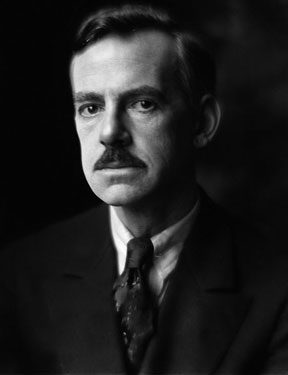- Tickets
- Memberships & Season
- Engage & Learn
- Your Visit
- Support
- Artists
- About
- Accountability
- Ticket Donation Requests
- Financials
- Rentals at the Goodman
- Our History
- Staff & Leadership
- Join the Goodman
- Press Room
- 2024-2025 Season
- 2023 – 2024 Season
- 2022 – 2023 Season
- 2021 – 2022 Season
- 2019 – 2020 Season
- Hershey Felder as Irving Berlin
- Goodman Gala
- A Paris Love Story
- Bernhardt Hamlet
- The Santaland Diaries
- American Mariachi
- School Girls; Or, The African Mean Girls Play
- Molly Sweeney
- graveyard shift
- Roe
- 42nd Annual Production of A Christmas Carol
- Dana H
- Daughter of a Cuban Revolutionary
- New Stages Festival 2019
- 2018 – 2019 Season
- 2017 – 2018 Season
- 2016 – 2017 Season
- 2015 – 2016 Season
- 2014 – 2015 Season
- About the Goodman
Artist Bio

Eugene O’Neill
Eugene O’Neill (1888-1953) is considered one of the greatest American playwrights of the twentieth century. His accolades include four Pulitzer Prizes in Drama—more than any other playwright to date—and the Nobel Prize in Literature. He received his first production in 1916 when the Provincetown Players performed Bound East for Cardiff in Provincetown, Massachusetts. O’Neill’s work was widely produced both in Provincetown and New York during the next several years, and the playwright was awarded his first Pulitzer, for Beyond the Horizon, just four years after his first Provincetown production. O’Neill’s reputation rose steadily throughout the 1920s; he received a second Pulitzer in 1922 for Anna Christie and a third in 1928 for Strange Interlude. During this same period, The Emperor Jones, The Hairy Ape and Desire Under the Elms brought O’Neill further popular and critical acclaim. He labored throughout the 1930s on an 11-play cycle called A Tale of Possessors Self-Dispossessed, which he never completed. He received the Nobel Prize in Literature in 1936 and in the early 1940s wrote three of his best works: Long Day’s Journey Into Night, The Iceman Cometh and A Moon for the Misbegotten. O’Neill considered Long Day’s Journey Into Night so personal that he left instructions for the play to be withheld for 25 years after his death. In the early 1950s, O’Neill and his wife moved to Boston, taking up residence at the Shelton Hotel, where he died in 1953. As the executor of O’Neill’s estate, his wife gave permission for publication and production of Long Day’s Journey Into Night. The play premiered in 1956 and won O’Neill his fourth Pulitzer in 1957, four years after his death.






















